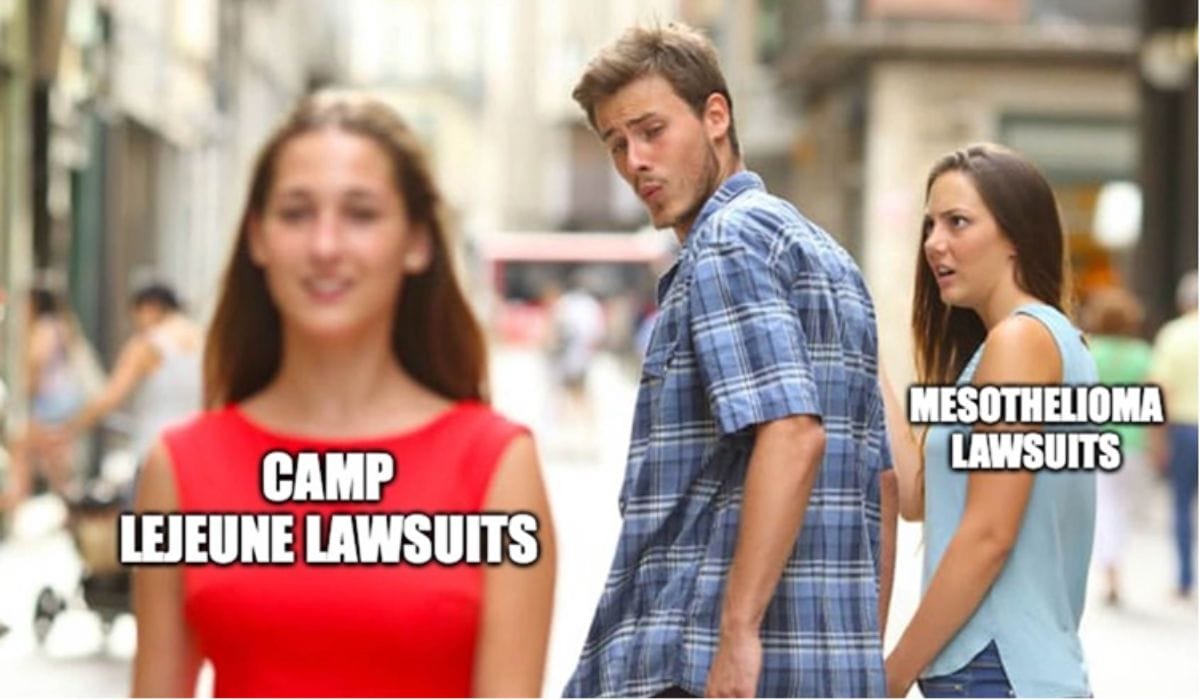As we reflect on the tidal wave of advertising that has characterized the Camp Lejeune litigation in 2023, a stark realization emerges: the industry has not only reached a saturation point but has also ventured into the territory of ‘The Big Fake.’ With an astounding $160 million poured into more than 800,000 television ads, what started as a noble endeavor to inform has spiraled into an excessive campaign, muddling the waters of legal advocacy, and misleading the public.
The Unholy Alliance of Greed and Inexperience
This unbridled greed, coupled with a staggering investment that far surpassed logical financial rationale, has laid bare the vulnerabilities in the legal marketing ecosystem. Law firms, in their rush to capitalize on the potential windfall from Camp Lejeune cases, inadvertently stoked the flames of an industry segment teeming with opportunists. Vendors, sensing an easy payday, flooded the market with services that ranged from the unethical to the outright fraudulent, exploiting the lack of stringent regulations and oversight.
Deciphering the Lessons from Complete Saturation
This unprecedented advertising spree has delivered several critical insights, underscoring the need for a strategic pivot in how legal marketing is approached:
- Awareness vs. Saturation: The campaign has blurred the line between raising awareness and inundating the public, challenging us to find a new balance.
- The Misleading Messaging Machine: Rampant SMS and Email marketing tactics often leaned towards sensationalism, eroding trust and setting unrealistic expectations among potential claimants.
- The Coaching Controversy: Practices that prep potential claimants to navigate intake processes under false pretenses have compromised the authenticity of genuine claims, clouding the legal pathway with questionable cases. If you caught Mikal Watts’ MTMP presentation in October 2023, then you know how Indian call centers played a role in outright fraud.
- The Dishonesty Dilemma: A troubling trend of potential claimants distorting their qualifications, driven by the chaos and the allure of compensation, has added another layer of complexity to the pursuit of justice.
Blue Sky’s Own Experiences with Camp Lejeune Marketing
Our initial campaigns related to the Camp Lejeune litigation, particularly an early success in 2022 and a subsequent campaign in Q1 2023, reaffirmed our confidence in our approach to legal marketing. However, our third campaign, launched in mid-2023, presented challenges that fundamentally tested our understanding of the industry and the behavior of claimants. For the first time, we encountered an overwhelming number of individuals deliberately misrepresenting their qualifications to a degree we had never seen before. This phenomenon starkly contrasted with the expected fallout in mass tort campaigns, which typically might see a 20-40% drop-off rate after thorough workup. In this scenario, the discrepancy was more than double that, leading to a particularly distressing experience for all parties involved and challenging our preconceived notions about claimant honesty and the integrity of the intake process. Since that time, we have turned down millions in ad spend for potential Camp Lejeune campaigns. From our perspective enough was enough. Certainly not an easy choice for our company but the only one that made sense.
A Firm Call to Cease Camp Lejeune Advertising
It’s evident that the narrative woven around Camp Lejeune advertising reflects broader issues within the legal marketing sphere, signaling a moment for profound change. The continuation of this advertising frenzy not only fuels ‘The Big Fake’ but also detracts from the legal profession’s integrity and the genuine pursuit of justice for those affected.
Envisioning a New Direction
As we stand at this crossroads, it’s imperative to embrace a future where legal marketing is anchored in ethical practices and genuine advocacy. This involves:
- Shifting the Focus: Redirecting efforts towards deepening engagement with those already aware and affected, rather than casting ever-wider nets.
- Evolving Strategically: Promoting targeted, ethical advertising that respects the legal process and prioritizes the welfare of potential claimants.
- Elevating Education: Enhancing efforts to educate and inform through direct, meaningful interactions that transcend traditional advertising.
Moving Forward with Integrity
The saga of ‘The Big Fake’ in Camp Lejeune advertising presents not just a lesson but also a clarion call for the legal marketing industry to recalibrate its compass towards more ethical, effective practices. By halting further advertising for this case, we can pave the way for a future where legal marketing upholds the highest standards of integrity and truly serves the best interests of justice.
Let this be the moment where we collectively prioritize the needs of those we aim to serve over the allure of widespread outreach, setting a new standard for responsible legal marketing for years to come.

